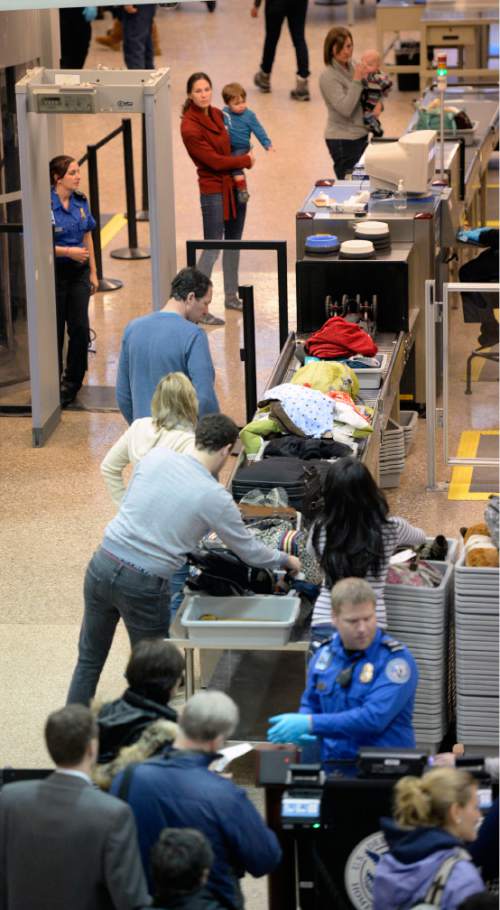This is an archived article that was published on sltrib.com in 2016, and information in the article may be outdated. It is provided only for personal research purposes and may not be reprinted.
Washington • Mushrooming airport checkpoint lines have passengers fuming, and thousands of them are missing their flights, but the challenge of balancing speed and security was captured in a single comment on Capitol Hill on Thursday.
"When we criticize you today about having long lines and taking too long to screen people, next week if there is a 'security' breech we will haul you up here and lambaste you for not being more thorough," Rep. Stephen Lynch, D-Mass., told Transportation Security Administration administrator Peter Neffenger.
The hearing before the House Committee on Oversight and Reform came as airports in Atlanta, New York and Seattle have threatened to dump the TSA and turn airport security over to private firms.
Twice in the course of the hearing, committee members shouted at Neffenger to make clear their frustration with TSA operations. One was Rep. John Mica, R-Fla., who said three associates missed their flight from Washington's Reagan National Airport on Wednesday after they arrived late and then were further delayed by lines at the checkpoint.
"You can't get a hold of a damned person at TSA, even as a member of Congress," Mica shouted. "I am so disgusted with this. You cannot recruit, you cannot train, you cannot retain and you cannot administer. It's just a huge, failing government program, and it will fail."
That moment was the nadir of the former U.S. Coast Guard admiral's appearance before the committee, which came not quite a year after he became TSA administrator. Neffenger assumed the office weeks after a damning inspector general's report that said undercover operatives were able to slip through airport security with weapons and phony bombs more than 95 percent of the time. They were able to carry weapons or bomb-like material through airport-security checkpoints in 67 of 70 attempts last year.
Neffenger has attempted to tighten security by putting the entire 60,000-member TSA workforce through retraining, opening a training academy in Georgia for new recruits and bringing in several new top administrators.
He also ended a practice in which random passengers were selected and allowed through special lines that were designed for travelers who had qualified by advance background checks for expedited screening.
That change he made to increase security has contributed to longer lines. Neffenger said that on "a big day" four years ago, about 1.6 million passengers processed through airport checkpoints.
"We're well above 2 million daily right now," he said.
When he came on board the agency last July, Neffenger said, there were 5,800 fewer checkpoint screeners than four years earlier.
"It was my suspicion that we did not have enough people to staff our lanes," he said. "My suspicion was correct."
He said passenger traffic far exceeded the rate projected by those who set TSA's budget.
Rep. Gerald E. Connolly, D-Va., cited reports that 600 passengers missed flights out of Charlotte on Good Friday because it took three hours to get through security, and that 7,000 American Airlines passengers missed flights nationwide in March because of security delays.
"I think we've improved significantly in just the last few weeks," Neffenger said. "I'm not aware of any of the wait times of the length you're talking about right now, and I track them daily."
Neffenger said that several classes were currently going through the TSA academy to augment the force of about 45,000 screeners. He said that workforce should grow by 768 this summer. The TSA is experimenting with "travel light" lanes at some airports to speed through passengers carrying no more than a briefcase or purse.
"It's the carry-on baggage that is one of the major slowdowns at a checkpoint," he said.
The committee also heard from John Roth, the inspector general for the Department of Homeland Security, the office whose undercover operatives so successfully penetrated TSA security last summer.
"We should not minimize the challenges the TSA faces and the grave risks that failure brings," Roth said. He said his office would conduct another series of covert attempts to slip weapons through airports this summer.
In a letter to the TSA last week, the authority which runs three New York airports — Newark, LaGuardia and John F. Kennedy — pleaded for more security workers and hinted it would step in to hire its own security force if nothing is done.
The New York/New Jersey Port Authority said that in one month this year at JFK, there were 253 instances when it took 20 minutes or more to clear TSA security. During the same period in 2015, the letter said, there were only 10 such instances.
"The patience of the flying public has reached a breaking point," the letter said. "We can no longer tolerate the continuing inadequacy of TSA passenger screening services."
Atlanta's airport said that by late last year, it was not uncommon for security line waits to last 35 minutes. Seattle also is exploring the prospect of hiring a private security force to replace the TSA.



